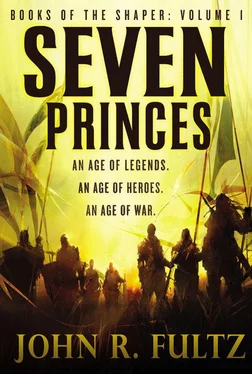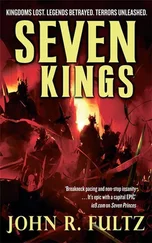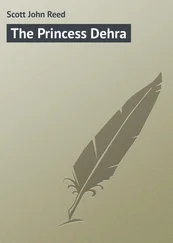John Fultz - Seven Princes
Здесь есть возможность читать онлайн «John Fultz - Seven Princes» весь текст электронной книги совершенно бесплатно (целиком полную версию без сокращений). В некоторых случаях можно слушать аудио, скачать через торрент в формате fb2 и присутствует краткое содержание. Жанр: Фэнтези, на английском языке. Описание произведения, (предисловие) а так же отзывы посетителей доступны на портале библиотеки ЛибКат.
- Название:Seven Princes
- Автор:
- Жанр:
- Год:неизвестен
- ISBN:нет данных
- Рейтинг книги:5 / 5. Голосов: 1
-
Избранное:Добавить в избранное
- Отзывы:
-
Ваша оценка:
- 100
- 1
- 2
- 3
- 4
- 5
Seven Princes: краткое содержание, описание и аннотация
Предлагаем к чтению аннотацию, описание, краткое содержание или предисловие (зависит от того, что написал сам автор книги «Seven Princes»). Если вы не нашли необходимую информацию о книге — напишите в комментариях, мы постараемся отыскать её.
Seven Princes — читать онлайн бесплатно полную книгу (весь текст) целиком
Ниже представлен текст книги, разбитый по страницам. Система сохранения места последней прочитанной страницы, позволяет с удобством читать онлайн бесплатно книгу «Seven Princes», без необходимости каждый раз заново искать на чём Вы остановились. Поставьте закладку, и сможете в любой момент перейти на страницу, на которой закончили чтение.
Интервал:
Закладка:
Tadarus refused to follow the conversation any further.
“Mind your place,” he said again, and spurred his horse back to the front of the line. Once more he rode alongside Andoses.
“How fares my cousin?” asked the Prince of Shar Dni.
Tadarus breathed deeply, calming himself the way a warrior prepares for battle. “Always the same,” he said. “Miserable, offensive, and insufferable.”
“Good thing he’s riding back there then, eh?” said Andoses.
Tadarus looked at his cousin and laughed. Andoses caught the laughter and returned it.
Fangodrel rode grim and silent behind them.
In the narrow belt of sky above the ravine, stormclouds scudded and rumbled.
Tadarus and Andoses were still laughing when the first of the cold drops fell.
The cave was a tunnel leading deep into the bowels of the hill. The darkness lived there, seething and flowing and breathing like some ancient beast. Sharadza walked into the depths of the earth, the dark flowing thick about her like honey. She smelled damp granite and the spoor of little blind creatures. She heard her own footfalls, clattering and booming in the lightless regions, and the crone’s voice called her deeper and deeper into the subterranean void.
“The [ze=, clatteri five senses are lies,” said the crone’s voice. She was somewhere nearby, hovering in the darkness. “Down here, without light, you will see more clearly.”
Stumbling, groping, crawling through the dark. Echoes of her own movements dancing across the walls, the invisible ceiling.
“The first step in learning sorcery,” said the crone’s voice, “is to look beyond the lies of the world. To see the invisible that dwells behind and beneath the visible. The world you know up there does not exist. Down here you are a newborn, and you must relearn. So you will come to understand the world in a new way. Eat this…”
Sharadza’s head swam, and she felt the crone’s hand against hers. She closed her fingers over some kind of root like a gnarled carrot. It smelled of dirt. “Eat,” said the crone’s voice.
Crunching molars, bitter taste vibrating on her tongue. The aftertaste of the sweet tea mingling with the earthy flavor of the root. Then a lightness, a dizzy flow, the pounding of blood in her ears.
The rough ground at her feet glowed now, a phosphorescence she had not noticed. A hue of nameless color. She raised her head. A vast cavern opened before her, a forest of stalactites and stalagmites stretching into the darkness. Some of them had melded into magnificent pillars, glowing with that same colorless color, glinting with crystalline deposits like skeins of diamond. The roof of the vault was too far overhead to see, as were the walls. Here was another world altogether. Now white mushrooms tall as Giants grew in the murk, with lesser fungi sprouting beneath them in masses of shifting, pulsing colors. How had she not seen all this a moment before? Where was the source of light? There was no light. She was seeing the darkness. No… seeing through the darkness.
The crone stood near a tall stalagmite, supporting her bent back with a wooden staff. She glowed like a rainbow, translucent and glimmering in wondrous shades that had no names.
“Who are you?” asked the crone.
“You know who I am,” said Sharadza, the non-lights dazzling her eyes.
“Who are you?”
“Sharadza.”
“Who is Sharadza?” asked the crone.
“The daughter of Vod and Shaira.”
“Who are you?”
The crone was gone. Tiny beings moved among the wilderness of fungi, glowing with life. Now the fungi sprouted above her like the forest of Uduria, and she walked – no scuttled – among the blossoming foliage. She sniffed, smelling color and sound and a dozen mysteries. Her hands and arms were gone. She had four clawed appendages now, and a proboscis nose, snuffling along the ground. The cave creatures greeted her with subsonic noises and bursts of scent. She responded by instinct. She roamed the fungi world for a time without measure, sometimes alone, sometimes with her pale-furred companions, dragging a long tail that switched and slapped the ground. She nibbled at the choicest of fungi, savoring its taste, going on to sample more. She ate, defecated, and [efeped moved on. She screeched, and fought, and fed again, and sang with her sightless brethren in the swirling fungus groves.
“Who are you?” came the crone’s voice.
It took her a moment to answer. “Sharadza,” she chirped as best she could.
Now she came to a dark underground lake lying serene beneath a vast dome of granite. Ripples moved across its surface now and then, and she saw the glow of life drifting in its depths. The crone said something, and Sharadza slithered forward, letting the frigid waters envelope her. She swam the black currents, moving her lithe body, flexing flipper-like appendages, sensing the movements of subaqueous creatures by their vibrations. She swallowed blind cave fish, swirled her serpentine self over slime-encrusted boulders, and flowed into a subterranean river that fed the lake. She avoided the lunging maw of something much larger than herself. She was not ready to be devoured. She followed the swift current like an eel. After an eternity, she sensed sunlight above, and rose to find the river flowing through the forested wilderness. The brilliance of the sun made her spasm and twist in the rushing waters.
“Who are you?” came the crone’s voice.
She slithered up onto the riverbank and opened her fanged mouth. With difficulty she said, “Sharadza.”
Now she ran through the forest as a great black wolf. She hurdled the swollen roots of the Uyga, reveling in the speed of her limbs, the keenness of her scent. She smelled game, the magnetic call of prey, and chased a buck for leagues through the leafy landscape. The sun was a ball of fire rolling across the sky, and the forest opened its secrets to her. They poured in through her black nostrils, and her thick fur stood on end. She drank from forest pools and chased another deer, bringing it down with fang and claw. She lapped up the hot blood, tore at the fresh meat, devoured the carcass until her belly was full. Her four-legged brothers and sisters came to share her kill, and she yowled her pleasure at the rising moon.
“Who are you?”
She howled into the twilight sky, “Sharadza…”
Now she became that howl, and the moon grew larger, a golden orb bearing down upon her. She flapped her wings and turned from its radiance. The northern forest spread like a purple carpet below. Mountains ruled the southern and northern horizons; to east and west gleamed the oceans whose names she could not remember. She whirled and spun in the night winds, exulting in the perfection of flight. She soared above the forest among hundreds of other wind-riders above and below her, all pursuing nocturnal hunts. She flew toward the dawn as the sun rose, an infinite well of crimson, gold, and white flame. She turned back and flew westward until it stood high in the blue sky.
“Who are you?” came the crone’s voice.
She hardly heard the question. She soared downward now, toward that sea of fall colors, entering the forest through its whispering roof, gliding along its cool corridors until she found the hill. She flew toward the cave mouth where the crone stood, one wrinkled hand held up to the sky. She landed on the crone’s forearm, sinking her talons into a leather sleeve.
“Who are you?”
Sharadza stood now before the crone, looking down at her two hands, her two legs and her cumbersome feet. She flexed her arms, her clumsy arms that would not lift her into the skies. She smelled the forest smells, a symphony of aromas rising from the wild, as if she had never before been here. It smelled of earth, of freedom, and of power.
Читать дальшеИнтервал:
Закладка:
Похожие книги на «Seven Princes»
Представляем Вашему вниманию похожие книги на «Seven Princes» списком для выбора. Мы отобрали схожую по названию и смыслу литературу в надежде предоставить читателям больше вариантов отыскать новые, интересные, ещё непрочитанные произведения.
Обсуждение, отзывы о книге «Seven Princes» и просто собственные мнения читателей. Оставьте ваши комментарии, напишите, что Вы думаете о произведении, его смысле или главных героях. Укажите что конкретно понравилось, а что нет, и почему Вы так считаете.












